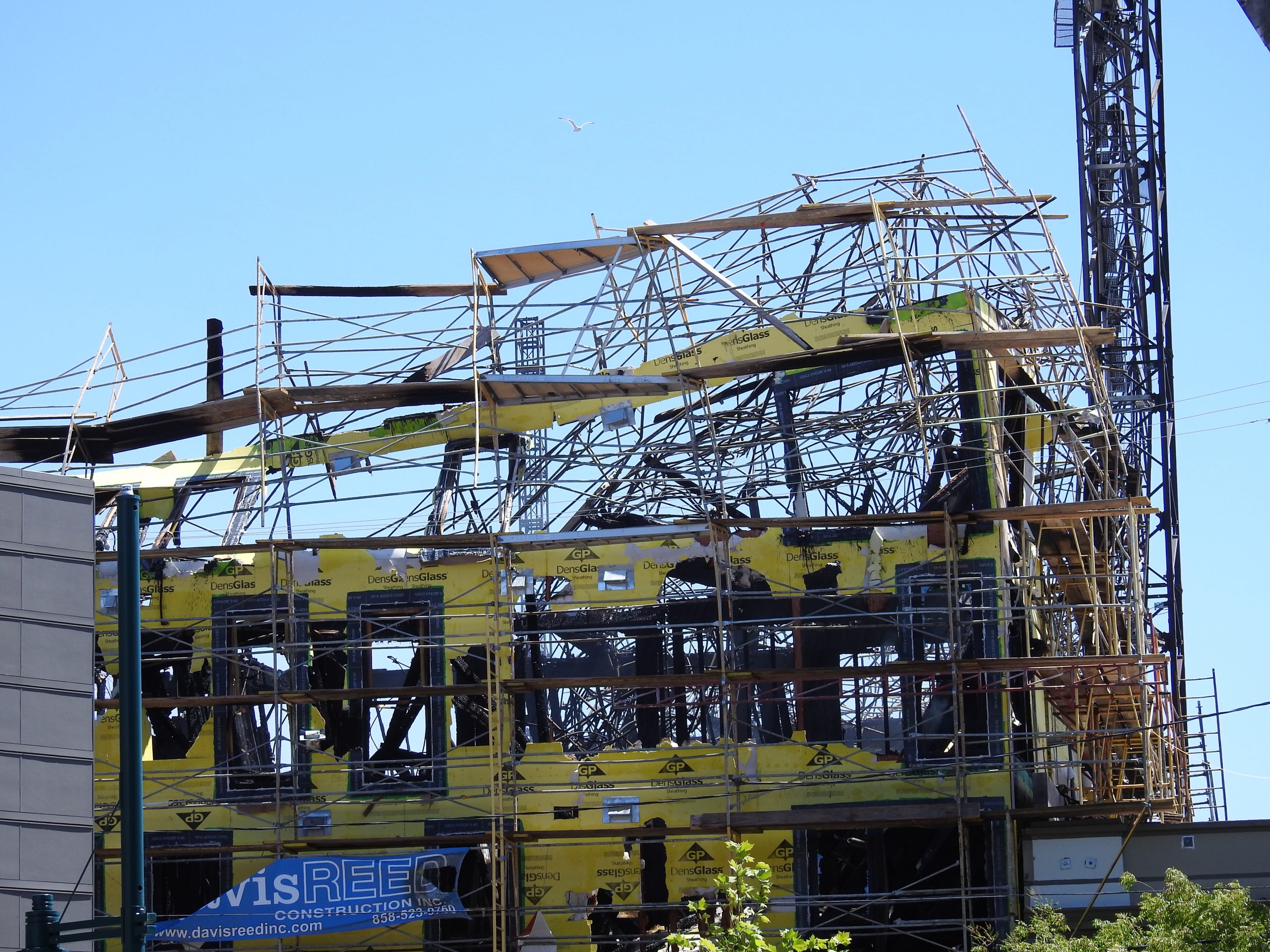For Oakland developers, the memory of four fires destroying residential construction sites in the last two years is still raw. Three of the fires have been confirmed arson, while the cause of the fourth is undetermined, but aside from some grainy video footage, no information about a possible suspect has been released. Developers have responded by greatly increasing security, and they’re bracing for insurance costs to go up. Some developers have even stopped using wood framing, while others wake up in the middle of the night wondering if their project is being consumed by flames.
“We have a horrible housing crisis in this city, and what’s getting built is just getting way more difficult and way more expensive to do,” said developer Rick Holliday, whose planned seven-story 105-unit apartment building at 3800 San Pablo Ave. on the Oakland-Emeryville border was burned down by an arsonist or arsonists twice since July 2016.
Holliday is still only getting started with the rebuilding after the most recent fire on May 13. But he says he’ll have to step up security significantly. He has also offered $50,000 of his own money to catch the perpetrators, doubling the reward offered by the federal Bureau of Alcohol, Tobacco, Firearms and Explosives. The ATF released video footage of a hooded man riding a bicycle to the construction site at 2:24 a.m. on May 13, putting on a mask and climbing the scaffolding.
While Holliday has been hit hardest by the fires, the blazes that torched his projects shared similarities with two other major fires at construction sites in the last year. On Oct. 31, 2016, a 41-unit apartment building at 317 Lester Ave. near Lake Merritt in a development by Adelphos LLC burned in a confirmed arson. The ATF is offering a $10,000 reward in that fire. On July 7, a six-story building with 196 market-rate apartments and 31,500 square feet of retail space at 2302 Valdez St. also burned down, damaging the surrounding residential and office buildings. Investigators were unable to determine a cause for that fire, but developer Wood Partners announced it was adding security in the days after.
As of early November, no suspects have been caught in any of the fires, and investigators have released no information about a suspected motive.
Many developers are spooked but still moving forward with their projects. Bob Huff, a project manager at Madison Park Financial Corp., one of Oakland’s biggest development and property management businesses, said that in recent months, the company has tripled its security budget.
“But it’s a no-brainer for us,” Huff said. “Versus having your project burned down, it’s worth it.”
Even though none of the five Madison Park projects currently under construction were targeted by arson, one of the company’s buildings sustained about $2 million in damage from the first fire at Holliday’s housing development. Radiant heat from the intense blaze destroyed windows and all of the siding at Madison Park’s apartment building at 3900 Adeline St. All 101 units were occupied at the time, leaving the company to make extensive repairs while trying to avoid displacing tenants.
“The development community is quite concerned,” Huff said. “It seems like there’s been a common thread with those fires. Whoever’s doing them doesn’t seem to have been caught yet, we’re all feeling very vulnerable.”
Haunted by the image of the masked, hooded man climbing Holliday’s scaffolding, Madison Park officials have made extensive upgrades to the security perimeters of their projects, particularly on ones that still have exposed wood. They’ve covered walkways and canopies along the sidewalk with plywood, making it difficult to climb, and lit the surrounding walkways 24 hours a day.
And if someone did manage to climb up, they’d find razor wire hung at 12 feet. The use of razor wire is forbidden by city law, except in cases in which the city planning department determines that trespassing could present a public safety hazard, like in electrical or gas substations or on transit routes. The city made a special exception to allow Madison Park to use razor wire, Huff said.
Building contractors aren’t allowed to store any flammable material on the site except for cans containing one gallon or less. Those cans also need to be locked up tight before contractors go home for the day.
Madison Park has also hired a new security company—the Oakland-based Vigilant Pro Private Security Services—which Huff described as “more aggressive” than typical security outfits. Its officers patrol on foot and approach and engage with everyone who passes by. Vigilant is providing security for all of Madison Park’s construction sites now. “They’ve absolutely been fantastic for us,” Huff said.
Mustafa Alshaif, Vigilant’s CEO, has been providing security to local businesses for the last six years and now employs about 150 guards. He’s been working with developers for a long time, but the emphasis has changed recently. Where they previously were more concerned with burglaries and vandalism, they’re now particularly worried about fires.
Vigilant has experience working with the ATF as well, which has a National Response Team that steps in to assist with particularly large fire investigations, bringing in numerous resources that local fire departments likely wouldn’t have available, like forensic chemists, accelerant-detecting dogs, and agents with specialized expertise in discovering fire origins. The ATF also stepped in to help investigate the deadly Ghost Ship fire a year ago. Representatives of the local field division for the ATF were unavailable to be interviewed for this report because they are assisting with the investigation of the mass shooting in Las Vegas on Oct. 1.
Vigilant provided perimeter security for the ATF following the Valdez Street fire, and security company officials were in the area for a different client when a fire broke out at Holliday’s project and made one of the first 911 calls, Alshaif said. The company has guards trained in fire prevention who wear body cameras to capture everything they see and report anything suspicious they come across.
But despite all the new security measures, Huff said that he and Madison Park CEO John Protopappas often go by the sites at night and make sure they’re OK. They even sometimes wake up in the middle of the night, especially in the days after a fire, and go out looking for reassurance that their projects are safe.
Madison Park has no plans to roll back its development in Oakland, but Huff said that the added expense of the extra security at this point is difficult to quantify, and they’ll have to maintain this stronger focus on security for the foreseeable future.
But Randy Miller, president of RAD Urban, said that if he were building wood-framed buildings in Oakland he would have serious second thoughts. Miller’s company just finished one market-rate apartment building in Oakland and has two more buildings under construction, all in the Temescal district. But years ago, the company switched from wood to steel framing, partly to avoid catastrophic fires.
“I still believe in Oakland; I think it’s really unfortunate that people think that this is the right way to express their differences,” Miller said of the arsonist or arsonists. Many developers and others believe the arsons have been perpetrated by antihousing activists.
“It’s going to get someone killed at some point, and the person who gets killed isn’t going to be a developer or a builder; it’s going to be a grandma or a kid sleeping in the building next door to a construction site. I pray that doesn’t happen, but if this keeps happening, it seems like it’s just a matter of time.”


